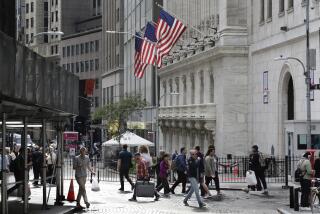Stocks regain some ground
- Share via
You can exhale -- the market bounced.
Stock prices climbed Monday as investors searched for bargains in the wreckage of last week’s deep sell-off caused by worries about a possible corporate credit crunch.
The Dow Jones industrial average gained 92.84 points, or 0.7%, to 13,358.31, recouping about one-sixth of its 585-point loss last week. The S&P; 500 stock index rose 14.96 points, or 1%, to 1,473.91.
But even bulls said it was far too early to know whether Monday’s trading was the first step toward a stabilization of stock prices or just a brief respite within a larger downtrend.
“At the very least, it gives you a breather,” said Tobias Levkovich, equity strategist at Citi Investment Research in New York.
Monday’s gains were broad based. The Nasdaq composite index advanced 21.04 points, or 0.8%, to 2,583.28.
The Russell 2,000 index of smaller-company stocks rose 6.40 points, or 0.8%, to 784.23 -- putting it back in positive territory for the year after turning negative Friday.
Advancing issues outnumbered decliners by about 2 to 1 on the New York Stock Exchange. Shares of financial-services companies, which were battered last week, helped lead the advance.
Merrill Lynch rose $1.45, or 1.9%, to $76.71, while Bear Stearns advanced $4.07, or 3.3%, to $127.25. American Express Co. rose $1.59, or 2.7%, to $60.14.
Stocks often rally after a decline of last week’s magnitude, in which the Dow slumped 4.2%. The market becomes “oversold,” prompting traders to search for short-term plays and buy-and-hold investors to scrounge for opportunities.
Market strategists at several top Wall Street brokerages, including Citigroup and Goldman Sachs Group, told clients that the sell-off was overdone.
They pounded the theme that underlying fundamentals -- including economic growth, corporate earnings, employment trends and investor sentiment -- generally remained positive.
“The bulk of the decline is definitely behind us,” said Jeffrey Kleintop, chief market strategist of LPL Financial Services.
Stocks were hammered last week on worries that contamination from sub-prime mortgages had infected high-yield, or junk, bonds, causing that market to seize up and disrupting the tide of private-equity buyouts that had helped to pace stocks.
The market was haunted by fear that investors’ sudden risk aversion could radiate to other areas of the bond market and block corporate America from borrowing for expansion.
The stock market won’t recover until investors feel confident that the worst of the sub-prime mess is over, said Bill Buechler, president of Barclay Partners Asset Management in La Jolla.
“In the past, if you were an aggressive buyer after a three- or four-day correction you were rewarded,” Buechler said. “But I don’t think rewards are going to happen this time.”
Bulls said stocks would recover -- but not right away.
“I don’t think we’re going down by a double-digit percentage, but I don’t think that seven or eight days from now we’ll have all this behind us,” said Bob Doll, head of stock investing at money manager BlackRock Inc.
It would a good sign if the market moved slowly rather than shot higher in knee-jerk fashion, said Jack Ablin, chief investment officer of Harris Private Bank in Chicago.
“I would actually be quite wary of a rally here,” he said. “That would suggest to me wild speculation.”
As stocks rose, so did Treasury bond yields, driving the 10-year Treasury note’s yield up to 4.8% from 4.76% late Friday. Its yield was above 5% seven trading days earlier but has since sunk as investors have fled stocks and junk bonds for safer ground.
The corporate bond market, however, brightened Monday on news that former General Motors finance unit GMAC was able to absorb losses from its mortgage-lending operation.
The implied risk of owning corporate bonds fell from its highest level in at least three years as the cost of derivatives used to insure bonds in the CDX North American Investment-Grade index sank to 0.72% of the bonds’ face value from 1.03%, according to Deutsche Bank. A decrease suggests improvement in the perception of credit quality.
The cost of such insurance on bonds issued by GMAC and its mortgage unit, Residential Capital, also tumbled.
In an indication that demand remains for cheap, risky assets, Chicago-based hedge fund Citadel Investment Group said it was buying the credit portfolio of Sowood Capital, a Boston-based hedge fund that is said to have suffered sizable bond losses.
Oil futures fell 19 cents to $76.83 a barrel on the New York Mercantile Exchange. The dollar was mixed against other major currencies. Gold prices rose.
In other market highlights:
• Shares of Dow Jones slumped $2.89 to $51.56 after News Corp. said it was “highly unlikely” that it would buy the newspaper company unless the deal got stronger backing from the Bancroft family.
• In Asia, stocks edged up in Japan and climbed 0.8% in Hong Kong. Shanghai’s main index jumped 2.2% to a new record. In Europe, key indexes rose 0.1% in Germany, edged up in France and fell 0.1% in Britain.
Times wire services were used in compiling this report.
More to Read
Inside the business of entertainment
The Wide Shot brings you news, analysis and insights on everything from streaming wars to production — and what it all means for the future.
You may occasionally receive promotional content from the Los Angeles Times.










